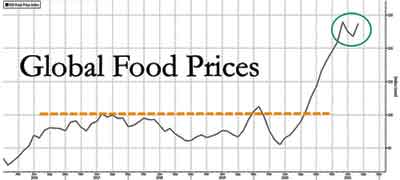China Power Crunch Could Force Global Food Prices Even Higher
Tyler Durden
 Global food prices climbed back to near-decade highs in early September, reviving concerns about inflationary pressures. A newly emerging risk that many have missed and could catapult food prices even higher this fall/winter is China’s difficult harvest season as power curbs hurt the outlook for production, according to Bloomberg. Global food prices climbed back to near-decade highs in early September, reviving concerns about inflationary pressures. A newly emerging risk that many have missed and could catapult food prices even higher this fall/winter is China’s difficult harvest season as power curbs hurt the outlook for production, according to Bloomberg.
Autumn harvest has begun for the world’s second-largest economy amid power constraints in at least 20 Chinese provinces and regions, making up more than 66% of the country’s GDP. Some of these regions are industrial hubs that have key manufacturing plants.

Among the worst-hit are industrial hubs in China’s northeastern heartland, such as Jilin, Liaoning, and Heilongjiang, where most of the country’s corn and soybeans are grown.
“The crisis is stoking concern that China will have a tough time handling crops from corn to soy to peanuts and cotton this year after some plants were asked to suspend or cut output to conserve electricity,” Bloomberg said.
Already, the power crunch has forced soybean processors in northern regions to shutter operations. There’s a big concern the electricity crunch could slash operating rates of corn processors that make products like starch and syrup, Chinese brokerage Huatai Futures warned.
Futures Daily, a state-backed media, said the power crunch “will affect the supply and prices of agricultural products, which is a matter of importance for the national economy and people’s livelihood.”
China has been a top importer of agricultural products over the last year due to domestic shortages, helping to drive global food costs higher.
This means that China might have to tap international markets for food supplies as domestic power curbs may reduce production. If China continues to aggressively source from abroad as some top growing areas, such as Brazil and Argentina, have been dealing with extreme weather that damaged crops, this could very well suggest that global food prices may be headed higher.
 our mission: our mission:
to widen the scope of financial, economic and political information available to the professional investing public.
to skeptically examine and, where necessary, attack the flaccid institution that financial journalism has become.
to liberate oppressed knowledge.
to provide analysis uninhibited by political constraint.
to facilitate information's unending quest for freedom.
our method: pseudonymous speech...
Anonymity is a shield from the tyranny of the majority. it thus exemplifies the purpose behind the bill of rights, and of the first amendment in particular: to protect unpopular individuals from retaliation-- and their ideas from suppression-- at the hand of an intolerant society.
...responsibly used.
The right to remain anonymous may be abused when it shields fraudulent conduct. but political speech by its nature will sometimes have unpalatable consequences, and, in general, our society accords greater weight to the value of free speech than to the dangers of its misuse.
Though often maligned (typically by those frustrated by an inability to engage in ad hominem attacks) anonymous speech has a long and storied history in the united states. used by the likes of mark twain (aka samuel langhorne clemens) to criticize common ignorance, and perhaps most famously by alexander hamilton, james madison and john jay (aka publius) to write the federalist papers, we think ourselves in good company in using one or another nom de plume. particularly in light of an emerging trend against vocalizing public dissent in the united states, we believe in the critical importance of anonymity and its role in dissident speech. like the economist magazine, we also believe that keeping authorship anonymous moves the focus of discussion to the content of speech and away from the speaker- as it should be. we believe not only that you should be comfortable with anonymous speech in such an environment, but that you should be suspicious of any speech that isn't.
www.zerohedge.com
| 



